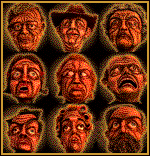CRITIQUE ARCHIVE
http://www.residents.com/albums/ginger.html
The Residents
By James DeckerThere's a narrative device that cannot be called a trick because it is the opposite of deceit. It is a device that tells nothing, the device is the subtle ditch, the abandonment of the story on the step of the reader's own reason. The device locates the story in numerous minds where it will take shape differently. I say this is distributed computing before electricity, transmedia where experience and sensibility is the medium. To leave off right when the story seems to climax opens up gaps, sneaks in the silence of reflection, the speechlessness of horror, and the heartbeat of desire. Chaucer, Shakespeare, Gertrude Stein, Bergman, Hitchcock, and how many more could be named masters of this device? But oral poetry had (and in many third world nations, still has) the best secret of this
device. Stories that are not indelibly written on paper can sprout new details, can engage the reader and threaten to unravel the reader's understanding
sending them back to work gathering together its old and new threads. Unresolvable threads even bring readers into discussion with one another, these discussions can synthesize new patterns, beg new comparisons, require reorganizations of understanding, and indicate new directions for the story.
Of course, paper need not be excluded from the new set of storytelling tools that digital media offer. The ability to synchronize various media opens whole worlds of possibilities for what is being called transmedia storytelling. TV shows can add back story via Web sites (yawn), embellishments and outtakes can be"aired" for any who are interested, and telephones may ring with automated
messages from characters "in real time" uttering the "real names" of viewers. But the power of these tools is to articulate a broader range of gaps that are the audience/participants personal knowledge and experience.
Unfortunately, we can expect the power of these tools to be misused at first, as a means to inundate rather than to suggest stories to audiences. Advertising will make sure of this folly, which is why we need to pay close attention to examples of stories well told. Numerous and frantic films of
Shakespeare's stage plays prove that it's not simply a matter of hauling classic tales into new formats. We need instead to attend to living artists who create original stories for new media and which do not re-duplicate television and film vocabulary. We need artists who unglue us from the screen so that stories can show in back of our eyes as well as right before them. One such example is the anonymous multimedia pop-artists The Residents. The Residents often begin their stories in childhood memories or appropriate famous personalities like Elvis, John Phillip Sousa, and Jesus to tell stories you feel you've always known, that persist in your memory and that want to continue. The Gingerbread Man is a fine example.
Initially, The Residents created a musical work where every song carried the same melody though each told a different story of very particular human suffering. We are cookie-cutter
souls with only different flavors of hope and pain. In addition to the music, the characters faces appeared on the Macintosh where each face could be "played," each triggering a story sequence. The story further evolved in a live performance, a one-time event at The Fillmore in San

Francisco where the Gingerbread Man story was retold according to Louisiana legend where the cookie boy survives the ravenous countryside to become the hunter of human hunger and suffering. The Residents Icky Flix released this year reveals the newest details of the story. Now seven years in the telling, the recent film is shown as part of the groups live stage performances, while audiences return to past versions of the tale to sort out the story in their homes and in their heads. Such examples are a pleasure to explore and are valuable for their ability to illuminate meaningful storytelling letting the monetary story take care of its insufferable self.

